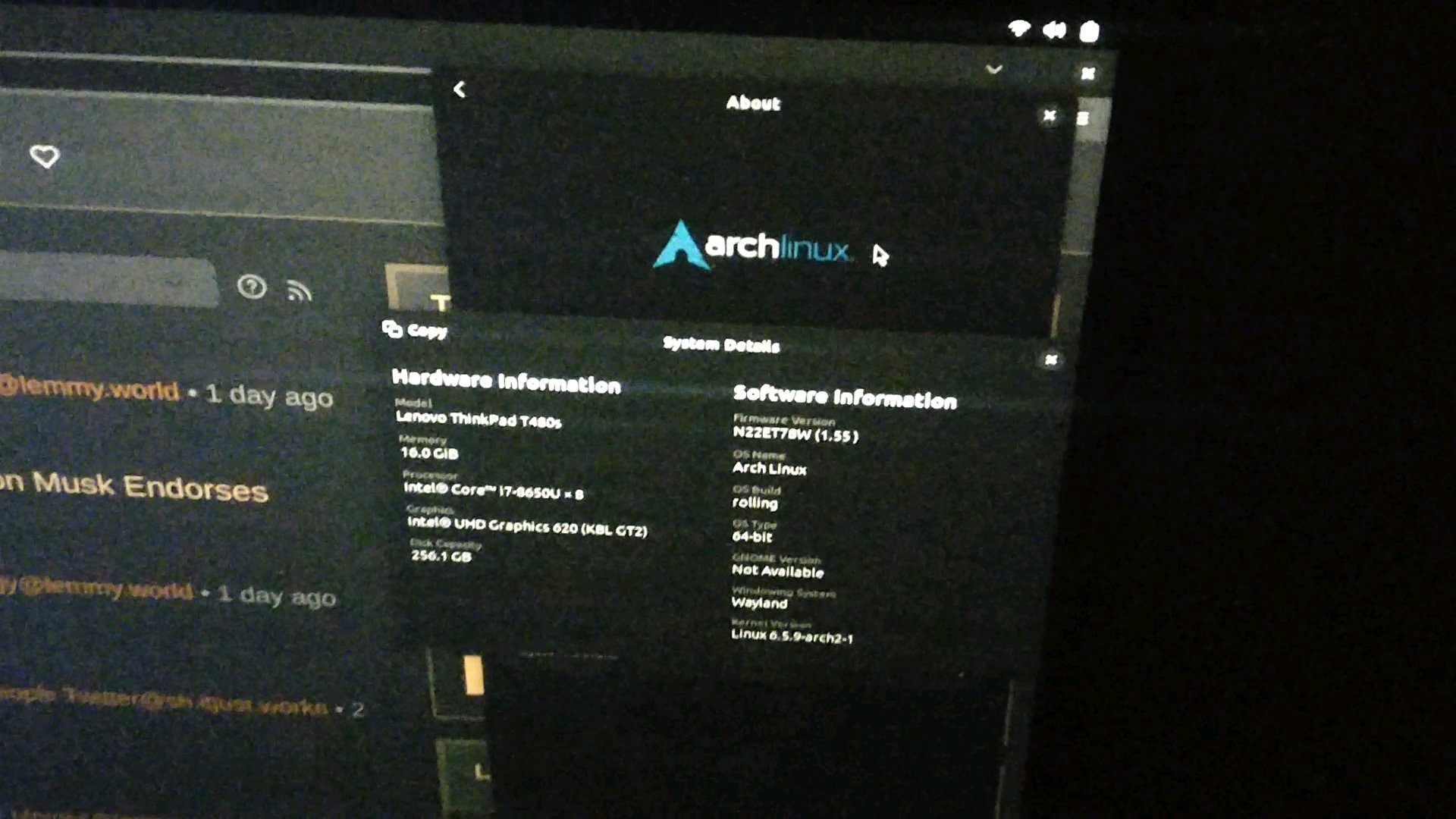

Are your monitors all the same resolution, refresh rate and size?
Mastadon - @Devorlon@social.linux.pizza


Are your monitors all the same resolution, refresh rate and size?


IIRC the French reactors are all nearing their end of service life and’ll be decommissioned soon.
What definition for piracy are your relying on?
The illegitimate procurement of media.
where did you source it?
My ass.
Does DMCA even have a definition for this?
Can’t help you there, I’m not American.
I’ve not argued any of those points. Just that not watching ads on YouTube is piracy.
In the UK, piracy isn’t a legally defined term, and the way that I would define piracy as the illegitimate procurement of media.
but TOS is often illegal anyway.
Piracy isn’t only a legal thing. It’s just dealt with through the legal system.
I’m not modifying any of the content
Sorry, I was wrong. You are however circumventing YouTube’s playing ads.
I’m a pedantic asshole.
You don’t have permission to modify any of the content YouTube sends you.
https://www.youtube.com/t/terms#eb887a967c
Section: Permissions and Restrictions Point 2
circumvent, disable, fraudulently engage, or otherwise interfere with the Service (or attempt to do any of these things), including security-related features or features that: (a) prevent or restrict the copying or other use of Content; or (b) limit the use of the Service or Content;
Piracy is sharing content that you don’t have the rights to share.
I’d classify watching something on piracysite.com as piracy.
I’d also class bypassing Netflix’s login requirements to watch their catalogue as piracy. But I guess that’s more a semantics thing.
Not saying you shouldn’t block ads, just questioning the OCs comment. If you don’t pay for the service monetarily or through data then imo it’s piracy.
Isn’t it? You’re not paying for a service / product.


If you look at every interaction with a Redhat developer in the context of them having KPIs / set work to do. The responses to non critical issues / MRs makes a lot more sense.
Not saying that it makes it any better tho.


I really want to be a part of good open-source projects
I get it, though I try to remind myself that perfection is the enemy of good. Especially in comparison to Discord which makes its money through [???] and is somehow only getting worse.


I based my assumptions on the parts in Revolts privacy policy, since reading the privacy policy of hCatpcha it alludes that each ‘vendor’ can select how much data they’d like to collect I assumed that Revolt only allowed them to collect IP, length of time on site and mouse movements. While they do sell information, they claim it to be anonymised and I contacted support to see how they did that for IP addresses.

Which is why I don’t really mind. The information they have of me is at most how my cursor moved, how long I took to Submit a login request, Submit a registration request, Submit a password reset / email resend request and an obfuscated IP. Seems OK to me.


That’s the part of hCaptchas policy that’s relevant to Revolt.
For the analysis, hCaptcha evaluates various information (e.g. IP address, how long the visitor has been on the website or app, or mouse movements made by the user). The data collected during the analysis will be forwarded to IMI.


Doesn’t seem that bad, when you go to log in it checks your IP, length of time on the site and mouse movements.
hCaptcha
This section has been adapted from hCaptcha’s documentation.
We use the hCaptcha anti-bot service (hereinafter “hCaptcha”) on our website. This service is provided by Intuition Machines, Inc., a Delaware US Corporation (“IMI”). hCaptcha is used to check whether the data entered on our website (such as on a login page or contact form) has been entered by a human or by an automated program. To do this, hCaptcha analyzes the behavior of the website or mobile app visitor based on various characteristics. This analysis starts automatically as soon as the website or mobile app visitor enters a part of the website or app with hCaptcha enabled.
When using the Revolt App, hCaptcha will only begin analysis when you:
Submit a login request.
Submit a registration request.
Submit a password reset / email resend request.
For the analysis, hCaptcha evaluates various information (e.g. IP address, how long the visitor has been on the website or app, or mouse movements made by the user). The data collected during the analysis will be forwarded to IMI.
Data processing is based on Art. 6(1)(f) of the GDPR (DSGVO): the website or mobile app operator has a legitimate interest in protecting its site from abusive automated crawling and spam. IMI acts as a “data processor” acting on behalf of its customers as defined under the GDPR, and a “service provider” for the purposes of the California Consumer Privacy Act (CCPA). For more information about hCaptcha and IMI’s privacy policy and terms of use, please visit the following links: https://hcaptcha.com/privacy/ and https://hcaptcha.com/terms.


There have been cases [1] where vulnerabilities in software have been found, and the researcher that found it will contact the relevant party and nothing comes of it.
What they’re suggesting is that the researcher who discovered this might have already disclosed this in private, but felt that it wasn’t being patched fast enough, so they went public.
What does Israel have to do with this?


Isn’t it a benevolent dictatorship with Linus at the head?
I’ve just finished watching Generation Kill on a Thinkpad T480s (i7-8650u). It was plugged into the TV, and it plus the laptops screen worked fine.
Running arch, gnome, wayland

You joke but…